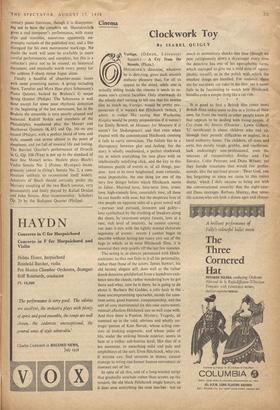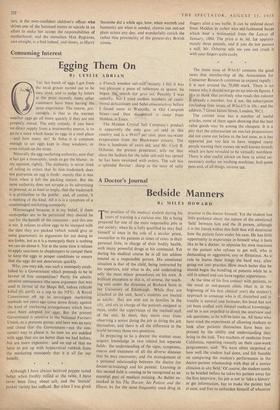Cinema
Clockwork Toy
By ISABEL QUIGLY
HITCHCOCK'S direction, whatever he is directing, gives such smooth aesthetic pleasure that, for all its appeal to the mind, while one is actually sitting inside the cinema it tends to re- move one's critical faculties. Only afterwards do the wheels start turning to tell one that his newest film to reach us, Vertigo, would be pretty pre- posterous if it weren't for Hitchcock (which, I admit, is rather like saying that Wuthering Heights would be pretty preposterous if it weren't for Emily Brontë, or Measure for Measure if it weren't for Shakespeare); and that even when treated with the concentrated Hitchcock' cunning it fails to carry conviction. The failure lies in a discrepancy between plot and feeling; for the story is wholly mechanical, a perfect clockwork toy in which everything fits into place with an intellectually satisfying click, and the key to this inhuman puzzle of events is, of all things, pas- sion : love at its most heightened, most romantic, most improbable, the one thing (or one of the very few things) before which Hitchcock seems to falter. Married love, love-term love, ironic love, high-comedy love, comradely love, all these he can handle with ease; but the desperate love of two people on opposite sides of a great moral wall —pursuer and pursued, innocent and guilty— love symbolised by the crashing of breakers along the shore, by enormous empty forests, love at a rare, rich level of intensity, he cannot convey; nor does it mix with the tightly wound elaborate ingenuity of events : events I cannot begin to describe without letting too many cats out of the bags in which, as in most Hitchcock films, it is essential they stop quietly till the last few minutes.
The acting is, as always, permeated with Hitch- cockisms; so that one feels in it all his personality, rather than those of the actors. James Stewart, his old laconic elegant self, does well as the rather dumb detective pitchforked from a humdrum exis- tence into the clouds, rather wondering how he got there and what, now he is there, he is going to do about it. Barbara Bel Geddes, a folic, laide in the most uncompromising spectacles, stands for com- mon sense, good humour, companionship, and the sort of cosy matrimonial (in this case extra-matri- monial) affection Hitchcock can so well cope with. And then there is Passion, Mystery, Tragedy, all summed up in the cold, obvious and wholly un- tragic person of Kim Novak, whose acting con- sists of looking enigmatic, and whose pulse of life, under the striking blonde exterior, seems to beat at a rather sub-human level, like that of a sea anemone, or something mild and pale and amphibious of the sort. Even Hitchcock, who can, if anyone can, find sermons in stones, cannot manage to wring one honest human movement or moment out of her.
In spite of all this, and of a long-winded script that gradually unwinds rather than screws up the tension, the old black Hitchcock magic hovers, as it does over everything the man touches: not so much in momentary shocks this time (though we peer vertiginously down a skyscraper every time the detective has one of his agoraphobic turns, which managed to give me a mild dose of agora- phobia myself), as in the polish with. which the smallest things are handled. For instance, there are far too many car rides in the film; yet it never fails to, be fascinating to watch how Hitchcock handles even a simple thing like a car ride.
* *
It is good to find a British film (since most British films today seem to live in ,a limbo of their own, far from the world as other people know it) that appears to be dealing with living people. 4 Cry from the Streets (Director:. Lewis Gilbert; 'U' certificate) is about children who end up, through their parents' difficulties or neglect, in a local authority home. The children, all sizes and sorts, but mostly tough, grubby, and vociferous, look endearingly non-professional, even the veterans of (respectively) Smiley, and The Shiralee, Colin Petersen and Dana Wilson; yet they handle situations that ,would fox profes- sionals, like the out-loud prayer : `Dear God, you bin fergetting us since we came to this rotten dump,' which I defy anyone to bring out with the conversational sincerity that the eight-year- old Dana manages. Barbara Murray, that versa- tile actress who can look a dozen ages and charac- ters, is the over-confident children's officer who drives one of the harassed mums to suicide in an effort to make her accept the responsibilities of motherhood; and the comedian Max Bygraves, cast straight, is a find indeed, and shows, as Harry Secombe did a while ago, how, when warmth and humanity are what is needed, clowns can out-act plain actors any day, and wonderfully enrich the rather thin personality of the present-day British screen.































 Previous page
Previous page